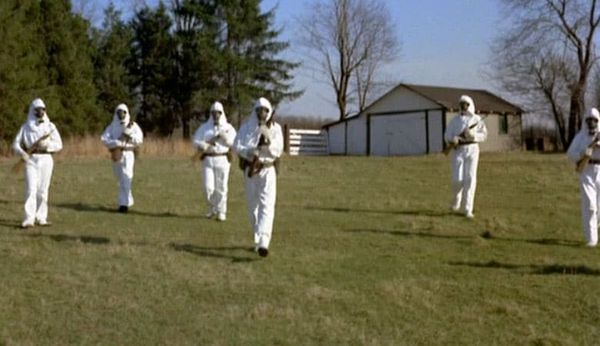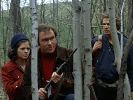Eye For Film >> Movies >> The Crazies (1973) Film Review
The Crazies
Reviewed by: Jennie Kermode

Before Outbreak, before The Cassandra Crossing, there was The Crazies.
It was 1973. Richard Nixon had just been re-elected. America was trying to pry itself out of Vietnam and the long term, generation effects of Agent Orange were just coming to light. The Convention on the Prohibition of the Development, Production and Stockpiling of Bacteriological (Biological) and Toxin Weapons and on their Destruction was yet to be ratified. In this climate, the idea that the US government might quietly be working on biological weapons had widespread currency. George Romero, restructuring a script by Paul McCollough, wanted to explore what might happen if such research got out of control.

Set in the real life town of Evans City (whose residents Romero praised for their cooperation), the film is quick to lay its cards on the table: a small plane has crashed in nearby hills and a biological agent it was carrying has leaked into the water supply. Immunity to this agent is very rare: over 99% of those affected will suffer death or permanent insanity. Faced with this, the military aims to quarantine the town. It's faced with cold equations. At best, the population can be peacefully isolated with no additional fatalities. If citizens attempt to escape, however, they will have to be stopped no matter what it takes. Superior military officers, at a safe distance, figure that in the worst case scenario they will have to nuke the town.
The details of this process, from hazmat-suited soldiers snatching children from their beds in the middle of the night to officers trying to communicate the desperate nature of the situation to local law enforcement, form the backbone of the film. Alongside them, we see something more familiar to cinemagoers of the time: bold young Americans standing up against an overbearing state. Young couple David (Will MacMillan) and Judy (Lane Carroll), troubled former soldier Clank (Harold Wayne Jones), gelfling-like teenager Kathy (Lynn Lowry) and her father Artie (Richard Liberty) go on the run, attempting to find a way out of the quarantine zone. Decades' worth of films had trained audiences to root for characters like them, but even early on it's obvious that they're developing signs of infection. If they are successful, most of the human species is likely to be wiped out.
There's a lot of meat in this double plot, and a lot of reflection on the techniques of cinema itself. The simplicity of the location, with its gentle green hills and thin woodland, makes it feel as if it could be anywhere, yet Romero positions his camera so as to generate maximum tension from it - we never know what might be behind that small rise, whether those wavering shadows in the distance are trees or people. The treatment of those whom the disease has made crazy mingles pity and contempt, bringing wider attitudes to the mentally ill into sharp relief. An old woman dispatches a soldier in a manner that calls to mind Psycho, inviting us to feel that trained fear, yet Lowry's character is an innocent, made vulnerable by her affliction. The question of what will happen to any survivors in the town pointedly goes unaddressed.
Subplots invite us to question whether characters working to find a solution are insane or brilliant; the symptoms of these states may overlap. Was it insane to create this weapon in the first place? Nobody seems quite clear whether it's a virus or a bacterial strain, but how many soldiers are privy to that level of information? The film is full of characters purporting to know more than they do, but ultimately, nobody knows how things went this far.
Reviewed on: 31 Oct 2017















